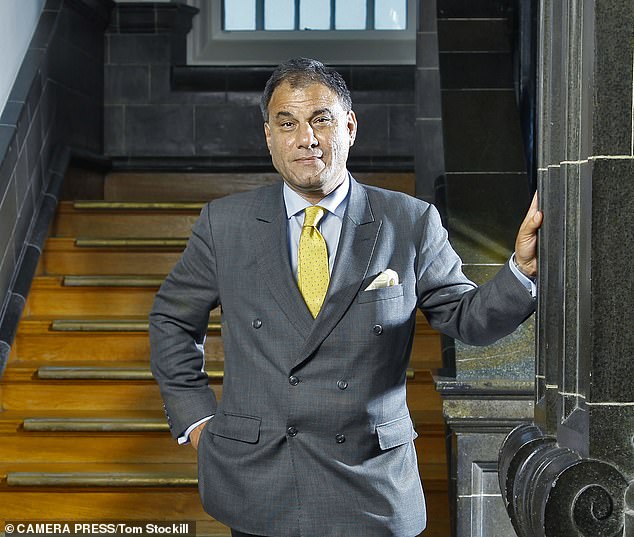Head of CBI and founder of Cobra beer Lord Bilimoria has blunt message for Chancellor: Don’t hike taxes now Rishi…give us a break
The new president of Britain’s most powerful business lobby group has slammed Rishi Sunak’s plans to pay down the nation’s Covid debts – and called instead for tax cuts for companies.
In a significant intervention, Lord Bilimoria today sets the Confederation of British Industry on a collision course with the Government over the Chancellor’s plans to ‘balance the books’.
Sunak last week hinted he was plotting tax rises to pay for his record Covid borrowing spree.

Sharp: Lord Bilimoria beat Covid himself and now wants to help the economy
But Lord Bilimoria uses his first newspaper interview since taking charge of the CBI in June to warn Sunak that squeezing firms for taxes now would leave Britain’s fragile recovery in tatters.
The Indian-born entrepreneur – who founded and still runs the Cobra beer empire – also called for the Government to fund mass home coronavirus testing to save jobs and businesses, and labelled suggestions that the second wave of Covid-19 cases had been fuelled by transmission in pubs and restaurants as ‘absolute nonsense’.
Bilimoria told The Mail on Sunday: ‘With record low interest rates, we can afford to borrow to save the economy and to save jobs, and the worst thing you can do is put up taxes. If anything you need to put taxes down. You need to help businesses to survive and incentivise growth to get demand back.
‘Business resilience is lower than it has ever been with cash and stockpiles running down, so when business is down on its knees, struggling in many cases to survive, you don’t want to stifle their recovery and their growth.’
Bilimoria’s rebuke may reignite the testy relationship between the CBI and the Government before the crisis, which culminated in Boris Johnson’s ‘f*** business’ comment in 2018 amid concerns over the impact of Brexit on large manufacturers.
To its credit, Bilimoria says that since the virus struck the UK, the Government has been on the same page as the CBI. Demands for loans, grants, cuts to VAT and business rates relief have all been heard and acted on. He says: ‘Government has listened and worked with us. This has all helped businesses survive and retain jobs.’
But he cautions: ‘The Chancellor is absolutely right to say we’ve got to balance the books, it’s a question of when you do it and how you do it.
‘The timing is very important, because if you do it too soon you stifle the recovery. And if you can get the growth going and stay really competitive you may not need to raise any taxes.’
Bilimoria breaks the mould of grey-haired City veterans at the top of the CBI. He succeeded Tesco chairman John Allan and is the first entrepreneur to run the powerful lobby group – and he is its first ethnic minority president.
Meanwhile businessman Tony Dankers will replace Dame Carolyn Fairbairn as director general of the CBI later this year.
Bilimoria is arguably something of a leftfield pick for the top job, having suffered at the sharp end of business. Cobra was put through a pre-pack administration in 2009 during the financial crash, leaving creditors £70million out of pocket after the collapse of a proposed sale to drinks giant Diageo.
Bilimoria now runs it as a joint venture with the American beer giant Molson Coors and has spent much of the last decade paying back creditors.
‘I know what it’s like to nearly lose everything and what you have to do to survive,’ he says. ‘That’s an invaluable experience.
‘I can empathise with what people are going through. Having seen the good and the bad times makes me far more fit to do the job than someone who’s just seen life through rose-tinted glasses.’
The nation’s battle back from Covid-19 comes alongside Bilimoria’s own recovery from the virus. While many of his peers in the House of Lords have been shielding – the average age is over 70 – the 58-year-old says he has been boxing his way back from a bedridden spell in March and is now fighting fit.
‘The moment gyms were open again I was back in the gym. I’m not allowed to spar again with my trainer, I can only use a boxing bag,’ he laments over biryani at a Michelin-starred curry house in Mayfair, London.
The crossbencher, sat in a sharp suit complete with pocket square and spotted tie, sweat glistening on his jawline, faced more pain in recent months. Cobra, which has 2,000 staff, was thrown into turmoil by the forced closure of restaurants in lockdown. But, he adds: ‘We did not make a single person redundant.’ His pride in the brand is apparent as he tells the waiter that he wants to pour our Cobra beers himself, before meticulously distributing the bottle’s contents.
He is effusive in his praise of the Eat Out to Help Out scheme, which offered discounts in pubs and restaurants through August.


‘It was a huge success. It gave that incentive for people who may be fearful to go out.
‘It gave the restaurants and bars that were suffering so badly a real boost. That worked very, very well to get the economy up and running,’ he says. ‘People say the Eat Out to Help Out scheme caused the second wave – absolute nonsense. Only 5 per cent of new cases come from the hospitality area.’
The entrepreneur was born in Hyderabad, and was educated in a series of schools in India and England. His grandfather was one of the few Indian cadets at Sandhurst and his father rose through the ranks to become commander-in-chief of the Central Indian Army.
Bilimoria holds a Cambridge law degree and qualified as a chartered accountant at what is now EY, before co-founding Cobra in 1989. His mission was to create a beer with the ‘smoothness of an ale and the refreshment of a lager’ designed to be drunk with food. Initially Cobra supplied curry houses, before branching into supermarkets and pubs.
Bilimoria believes his personal coronavirus battle exemplifies mistakes made in the Government’s testing approach. ‘It hit me from nowhere. I had a headache, fever, I was aching, shivering, then I lost my sense of smell,’ he says.
He struggled through a virtual CBI board meeting and later phoned a doctor via a parliamentary hotline, but was dismayed not to be able to get a Covid-19 test. Bilimoria recalls the conversation: ‘He said, ‘Sorry you can’t, but to reassure you even doctors and nurses can’t get tested, only patients.’ So that’s how poor our capabilities were then.’
Eventually, an antibody test in Germany gave a positive result.
He argues that rapid and regular testing is the key to unlocking the economy, allowing theatres and clubs to reopen, akin to the Government’s ‘Moonshot’ plan.
But he says that Abbott Laboratories’ $5 pregnancy-test style Covid19 check, used in the US, should be used and backed up by an official Government test if users get a positive result, adding: ‘My dream scenario is that we have these mass instant tests at home, which would relieve the pressure on Government facilities.
‘The cost of that to test 66million people twice a week, it’s about £2billion a month. What is £2billion for the next six months compared with the £200billion we’ve already spent? By doing this you enable the economy to fire on all cylinders. You can get on with it.’
Bilimoria is also Chancellor of the University of Birmingham – a post once held by Prime Minister Anthony Eden – and chairman of the UK India Business Council and President of the UK Council for International Students Affairs.
Looking more broadly at the economy, Bilimoria says Sunak can boost growth with investment in infrastructure – from transport to digital connectivity and green initiatives. This would create jobs, boosting the tax take from the UK’s three biggest taxes: national insurance and PAYE income tax, paid via employers, and VAT which grows with consumer spending.
He also hopes to use the momentum of the Black Lives Matter movement to fuel diversity in the boardroom. Earlier this month, he launched the CBI’s Change the Ratio group with the target of at least one member from an ethnic minority background on each FTSE100 board by the end of 2021.
